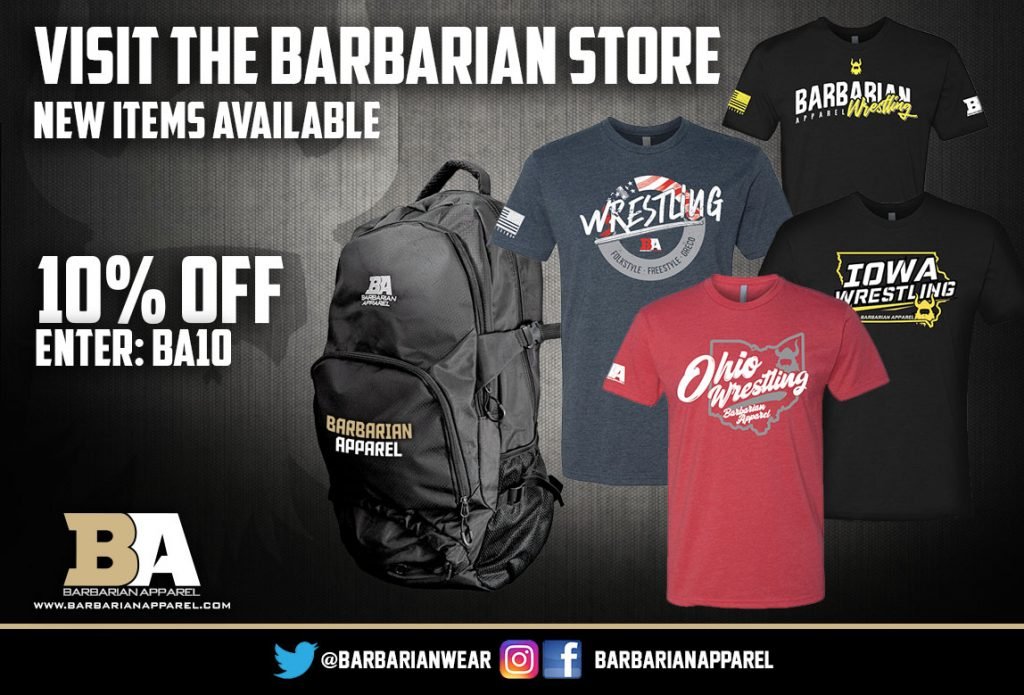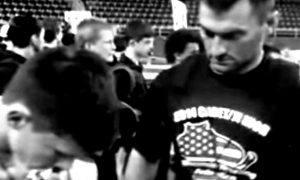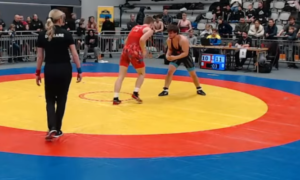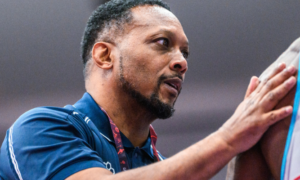Welcome to the first entry of the USA Greco Gold Medal Series, which will be a six-part feature highlighting each of the six living athletes who earned gold medals at the World Championships or Olympic Games.
The purpose of these entries is not biographical, at least not in totality. As is the case with much of the content on 5PM, the Gold Medal Series is presented in an interview format. The difference here is that subjects are asked the same six questions, though in certain cases may be customized for a more accurate effect and understanding.
First in the lineup is Rulon Gardner, perhaps the most famous Greco-Roman athlete in United States history. Everyone remembers where they were during the 2000 Olympics when a then-29-year-old Gardner ousted legendary three-time Olympic/nine-time World champ Alexander Karelin of Russia. It was a victory that not only made Gardner an instant celebrity, but also served as an example of American strength and perseverance. It illuminated what that generation of the US program became best known for — attacking their decidedly more classical opposition with absolutely no mercy.
Gardner followed up his unbelievable gold in 2000 with a World title in 2001, becoming the first (and still at this point in time, only) back-to-back champ for the US. In other words, what happened in Sydney wasn’t some happy accident. It wasn’t just one tournament, one crazy match that forever altered the perception of his career, only to fade into relative obscurity 12 months later. Gardner’s will to win — and monumental work ethic — allowed him to seize on the defining characteristic upon which all great athletes are ultimately created: an unshakeable sense of self-belief.
It would be foolish, if not a disservice, to exclude the fact that Gardner cheated death by surviving in -25 degree temperatures for over 18 hours following a snowmobiling foray in the Wyoming woods (and which led to the removal of a toe) — and how he recovered to make the subsequent Olympic Team, adding the bronze medal that resulted in his Greco career’s swan song. There’s also the plane crash just over a decade ago. Remember that one? How Gardner was a passenger in a small plane that dipped into the water, forcing he and two others to swim to shore?
Not normal.
Still, he doesn’t hang his hat on any of this. If Gardner is trying to get a point across, it is that his story — for all of its wonder, uniqueness, and accompanying adulation — could and almost should be replicated. You can do what he did, or the equivalent in whichever walk of life you happen to occupy. If anything, this elicits a rise of exasperation out of him, as it does Dennis Hall (who never met a fit of rage he didn’t like). These are men who have a difficult time trying to grasp why people don’t work harder, make disciplined sacrifices, and believe in themselves more. If there is anything that keeps someone like Gardner up at night these days, it is that.
5PM USA Greco Gold Medal Series
Entry #1 — Rulon Gardner
5PM: When going against foreigners who were more accomplished than you, at least earlier in your career, what was your approach?
Rulon Gardner: Even when I was accomplished my approach didn’t really change, because technically, you knew the foreigner was going to be a higher level than you. So what you had to do was make them feel kind of uncomfortable and you had to make them feel that they weren’t in control. Typically, a foreign wrestler uses his technique — and that’s his confidence. He doesn’t have to get out of position. But if you can come out and pick up the tempo from the start, you can make him feel like he has to try and slow things down, or become more aggressive and initiate the contact.
That was one part of it. But what I had seen was Dennis Hall. I remember one year in Cuba we were wrestling and the Cubans just kept letting the time go until finally the Cuban scored on Dennis. And as soon as he scored, they threw in the time and that was it and Dennis had lost. It was a setup. They were going to win at all costs. Then in 1995, Dennis won the Worlds and his philosophy was, Well, if I can’t beat you, I’m going to beat you up.
You could see that the foreigners didn’t like the physicality, the aggressiveness, the battle. That’s the thing, they didn’t like the battle. What they liked was the posture, the positioning. They were of a more classic and refined sport. I think as Americans you have to go with your strengths, and I think for us, we’re fighters. We go through high school and college learning how to be aggressive and physical. That’s when I first started seeing it. Then it was, Okay, the refs are not going to let you continue to be physical, punch ’em, and get really nasty, but you still need to make your opponents feel that the whole time they are in a war, they are in a battle. It made them feel like they had to either initiate it or pick up their speed to meet yours. Because the opponent realizes that he is now behind. Then they’re thinking they have to be more aggressive and it creates kind of a level playing field because as soon as they pick up their speed, you can control things and slow them down. Or pick them up and throw them down since your opponent is now feeling completely out of control.
It’s like the (Olympic) bronze medal match in 2004. I wrestled the Iranian (Sajad Barzi) who was 6’9. He threw everyone in the tournament. You knew that if you stepped in he was going to bodylock and throw you. As soon as you stepped in he was going to start setting his hips, so you had to be moving. If he hips me there, I’m going to move over there, snap here, push there, and off-balance you. Once you do that, these guys feel so uncomfortable that they can’t compete. That’s how you break them, and that is what I learned from Dennis, (Steve) Fraser, (Matt) Lindland, and everyone around. We just made it a war.
5PM: Can you remember a specific turning point in your career that made a difference?
Gardner: Probably when I first started wrestling Greco. Even though I was developing, my first day of practice in Colorado Springs Matt Ghaffari truly dismantled me. He understood every situation and I didn’t. He was just so much better than me. I had wrestled a little bit of Greco but I wasn’t really serious about it until I graduated from college. It was, Okay, 1995, you’re going to make a big run at this, even though I still had one more year left of school. I trained with Matt, he broke his leg, I won Nationals and then he beat me at the Trials. When I came in, he educated me in every position. Being so outclassed it was like, Holy crap, what are you going to do? So you hurried up. And the more you hurried up, Matt was waiting for you. The more you tried to out-position him, the more he was in better position. He truly understood the sport and I didn’t.
So then it was, How can I be like him? Well, the only way you can be like him if you put in the time, the effort, and you need to understand the positions. I worked with Roman Wroclawski back then, I was kind of living in Arizona. Roman would preach patience, how it takes time to understand these positions. And, the only way to understand these positions is by doing them everyday. I remember being like, Roman, teach me…Roman, teach me. He would say, Rulon, you’re done for the day. You’ve learned enough for today, so relax, come back, and we’ll teach you more tomorrow. It was hard because you have to learn to stay patient.
It was right at the beginning of my career. I didn’t start wrestling Greco until after college. If you look at it, my first tournament was the Olympic Festival in 1993 and my second tournament was 1994. So if you really look at it, I didn’t start wrestling Greco until ’94. Six years of wrestling Greco is how long it took me to win the Olympics. I didn’t graduate college until ’96 and I was doing Greco part-time, plus I was also still on the National freestyle team. In 1997, I wrestled both styles at Nationals.
5PM: How did experiencing international success change your mindset, training curriculum, or just the general way you saw the opposition?
Gardner: Well, it really didn’t because my problem was that I would go and win tournaments. I won in Cuba, Poland, and I’d go into a lot of these tournaments and win them. ’95, I won Nationals, Ghaffari was hurt and then came back and beat me at the Trials. Then in ’96, I wrestled at Nationals and ultimately I had my staph infection that caused me to miss the weigh-ins (for the Trials). In ’97, Ghaffari took the year off and I took fifth at the Worlds. In ’98, I was #3 in America and Ghaffari took second (at the Worlds). 1999, (Dremiel) Byers took sixth at the Worlds and I was #3. 2000 is when I finally made the breakthrough, beat Ghaffari, made the Team, and won the gold.
A lot of guys think, I’m #1 in America, and then focus on the rest of the world. For me it was like, I can beat the rest of the world, but I couldn’t beat Ghaffari. I couldn’t beat the American guys (laughs). You leave the country thinking, These are the guys I’m going to have to fight. But really, I had to worry about making the Team at home before I could worry about beating the rest of the guys. And these other guys were just warm-ups to help me beat Byers and Ghaffari. It was backwards and I think that was good because I had to focus so much everyday on just winning at home and that got me on a higher level, so that when I did go overseas, I was already at that next level. I think it made me initiate and become more aggressive than if I was just dominant at home and overconfident. If it was the other way around, I might have went overseas and not pushed myself enough. It pushed me the whole time to never give 50%. If I couldn’t make the Team, that meant I couldn’t win a medal. All of the international success didn’t matter unless I could make that Team.
I humbled myself. When I took fifth at the Worlds in 1997, it wasn’t until three years later in 2000 that I made the Team again.
5PM: How much credence did you put into draws at the Worlds or Olympics, regardless of format?
Gardner: The draws are everything. At the Olympics, I pulled #15. Well, guess who #14 was — Karelin (laughs). I pulled my number and we were right next to each other and I was like, Okay, this sucks. It might be a quick tournament. Because, for these foreigners conditioning is a big deal. We’d wrestle two-hour matches. I talk to guys who around the sport now about Fraser’s two-hour matches and people think they were stupid, that they were dumb. No, they were the best thing in the world. I learned so much about myself wrestling that two-hour match. It wasn’t about conditioning for two hours, it was about mentally doing something no one would ever do.
But that draw, it was huge because the guys I was scared of when I was coming up, like Hector Milan or Karelin… Like Karelin. if he’s fresh and I’m wrestling him fresh at the Olympics, he is probably going to be a different battle compared to at the end. In Sydney, he watched me being down 2-0 in the semifinals and then I won the match 3-2. So when he saw me down 2-0, he thought that ultimately, he would beat me in the finals and it would be no big deal. Why? Because the guy I was down 2-0 to he could crush, and he did crush him. But it was the tournament setup.
That’s why I think the draw is so huge. The next year, in 2001, there I was (at the World Championships) and I draw #15 again. I’m like, Crap, last year #15 was good but this year it’s bad, because my bracket was loaded. And I came through again. In the quarterfinals I was losing to the #1 Russian (Youri Patrikeev). He was beating me 3-0 with :30 left until finally I bodylocked and pinned him as time expired.
The best guys, you want them to get beat up, you want them to go through wars. That’s one of the advantages for the Americans. I know I can handle the war. Why do I think that? Well, look at World War II. My favorite movies are We Were Soldiers and Saving Private Ryan. It’s like, Here comes the Americans. You know what? The best warriors in the world are the Americans. We commit when the times require us to. We’re the baddest and toughest guys in the world. I felt the same way. When I’d go to Europe or some foreign land, I took that same courage and I’d watch those movies while overseas. And I took their courage, and that drove me to want to make American proud. It made me want to wrestle to another level. It made me want to show Europe that Americans might not be good at Greco, but this guy is. This guy, if he can’t beat you, he’s still going to give you everything he can. And look what happens.

Gardner and Dremiel Byers take a photo op prior to the 2008 Beijing Olympics. (Photo: John W. McDonough/SI)
5PM: What do you believe are the key differences, in whichever ways, between your generation and the current one?
Gardner: I think when you hear from a coach, Oh, these kids are different nowadays. They’re just not as hard, just not as committed. You can’t push them like you used to, it’s like Why not?
Lindland and I, we sat down with Mike Houck and he said, “Rulon and Matt, I want you two guys to be the leaders, I want you guys to make the Olympic Team. You don’t have much, you don’t look like much, but I want you two guys to be the future.” It was a challenge. He challenged us. And we took it to heart, even though I was coming in with like, zero experience. But I had wrestled in Cuba and won that tournament. When I came back, Houck made the comment, “Rulon is the best American Greco wrestler in history.” People were attacking him, being all aggressive, and saying stuff about that comment. But when I heard he said that it made me proud. It made me believe in myself.
Coaches aren’t challenging the guys. Now I’m coaching high school and I am starting to some of these kids saying this stuff. The other day in practice, I told them, I love you guys and I want to see you guys do great things, but I’m going to push you, I’m going to challenge you. I don’t want you to quit on yourself. I’m not going to make you do stuff you can’t do, but I am want to make you wrestle at a different level than most high school kids can. That was what our coaches asked of us and I am going to ask that of the next generation. If I’m down to two kids at the end of the year, then okay, maybe I pushed them too hard. But you don’t know unless you’ve been pushed.
There’s a quote I read and I can’t remember the full quote, but it goes something like, If a man is not challenged he is weak; but if a man is truly challenged and prevails through adversity, that’s how he becomes a man. He develops that distinction of truly being a provider and a warrior, and I wanted to be that. Nowadays, it’s show up and get your participation certificate that says you wrestled at the Worlds. In 1997, when I took fifth at the World Championships, I walked off feeling pretty proud of myself. But then I was mad when I watched the finals because I thought I was at that level, and I wasn’t. So what did I do? I went home, I trained, and it took me three years for me to make that Team again. It took me those three years. That made me say, Wow, I’ve got to push myself, I’ve got to challenge myself.
You look at people like Michael Jordan, people who are champions, and you ask, Why are they champions? Well, it’s not what the coach asks you to do, it’s what you ask of yourself.
5PM: If you were coaching at this upcoming World Championships, what would you want the athletes to know before they stepped on the mat?
Gardner: What would I like them to know? I’d tell them, The night before competition we’re going to role play and visualize, and you just lost your first match. You’re out of the tournament. You lost, you’re disgraced, your family was there, you didn’t show up to wrestle, and you did a horrible job. But then I’d say, Okay, now step back. You have a chance to fix that right now, so what are you going to do?
I would do that in my head. So that night I’d be like, Oh, I get a second chance tomorrow. I get a second chance. I realized that these guys were better than me, they were stronger, taller. I looked around at the Worlds in 2001 and I was like, I’m the shortest heavyweight here. The Hungarian (Milhaly Deak Bardos), who I beat, he was 6’6. But then it was, Yeah, well Rulon, you’re the only one here with an Olympic gold medal, too. I was 6’1, the next closest heavyweight was like 6’5. Everyone was huge compared to me. I wasn’t anything special. Truly, I wasn’t. But when I trained with Byers, I made myself special. Byers was twice as good as I ever was, but I found a way to win. I found a way to represent, to walk out there and make them think, If I can’t beat the American, it’s okay. Because, they looked at Americans as weak. I wanted that guy to know that if he wrestled me I am either going to either burn his lungs, beat him up, or take him to a place he’s never been.
If you don’t make your opponent feel as though he’s been through a war, the Americans, typically, we’re going to lose. Because we don’t have the kids who have been training since they were four like the Russians. So technically, yeah, they are going to be better than us. Understanding the philosophies of the sport, they are going to be better than us. A gutwrench? I didn’t wrestle with a gutwrench. When did I learn a gutwrench? After college? These guys have been wrestling for 15 years understanding a gutwrench. So I was training with (Bruce) Baumgartner in freestyle. He had one of the best gutwrenches and he used to school me everyday. We worked and worked and worked and worked, until finally, I got a pretty good gutwrench but I had really good gutwrench defense.
It was also about finding the competition. I think in 2008, they didn’t want to wrestle a second tournament right before the Olympics. Something like, We don’t want to wrestle so close to competition because if we wrestle there, we’ll be tired, we’ll be exhausted. So they chose not to go overseas to wrestle in that tournament and then they went to the Olympics and got mowed down. I don’t think they had the fire, the warrior aspect, or the warrior heart. A month before the Sydney Olympics, we went to Russia and I got pinned in :13 in the finals. All of the confidence I had about making the Olympic Team, grandstanding, and feeling good about myself went out the window. I can’t even beat the #2 Russian a month before the Olympics? But I humbled myself, came home, and then went to Sydney with no ego. I had nothing except for a desire to compete and to show the world what I could do. And I wasn’t going to quit until I did it.
Ultimately, I won the match with Karelin and I asked (Dan) Chandler, What the hell happened? I had no idea. It surprised everybody. We had trained ourselves to a level no one had ever been to. None of us. It was a special place. I was willing to follow them, and they were willing to push us. That’s why you had (Garrett) Lowney, Lindland, and all of those guys. The coaches, they challenged us. They took it to us.
I remember when I made the Team and I beat Ghaffari, they said, Well, there goes our chance of winning a medal. At the first meeting we had, Fraser was like, Hey, I want you guys to know everyone is telling us that we’re done, that there’ll be no medals for us. That Greco is a pastime sport, that we’re nothing, so no medal for us. But we’re going to train, we’re going to push, we’re going to commit, and we’re going to show them — because I believe you guys do have the ability to win medals. Well, guess what? We had a gold, a silver, and a bronze. Why? Because our coaches challenged us and we looked at all that stuff as a motivator instead of as a negative. And that’s what drove me to two Olympic medals and a World Championship.
CLICK HERE TO DONATE TO THE USA GRECO-ROMAN PROGRAM
SUBSCRIBE TO THE FIVE POINT MOVE PODCAST
iTunes | Stitcher | Spreaker | Google Play Music | RSS



















